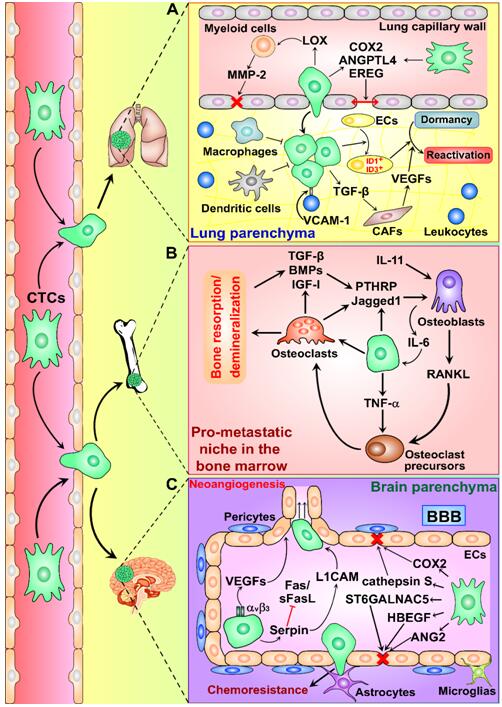The research group led by Prof. Long Zhang from Life Sciences Institute (LSI), Zhejiang University has recently published a review entitled "Molecular insights into tumour metastasis: tracing the dominant events” in The Journal of Pathology on December 2016.
Metastasis of malignant cells to vital organs remains the major cause of mortality in many types of cancers, especially breast, lung, colorectal and liver cancers. The tumour invasion-metastasis cascade is a stepwise and multistage process consisting of local invasion, intravasation, survival in the circulations, arrest at distant organ sites, extravasation, micrometastasis formation and metastatic colonisation. Recent researches have demonstrated that tumour cells of different origins exhibited different tissue tropisms towards distant colonisation. Moreover, interactions of tumour cells with stromal cells, endothelial cells and immune cells will aid them to gain survival advantages, evade immune surveillance and adapt to the new host microenvironment. This review delineated three main aspects of the dominant molecular events on the regulation of metastasis in detail: 1. regulation of TGF-, Wnt/-catenin and Notch pathways on the epithelial-mesenchymal transition (EMT) in the local invasion; 2. resistance of circulating tumour cells (CTCs) to anoikis in the circulation; 3. tissue tropism colonisation, extravasation and capillaries infiltration of tumour cells.
We also raised some opinions on the traditional concepts which are being challenged such as whether EMT is requisite for tumour metastasis. In addition, we put forward some suggestions and solutions against the clinical problems concerning multi-drug resistance and drug combination toxicity. The “precision medicine” for metastatic cancer treatment calls for smart combination of proper therapies and personalized therapeutic regimens. In the future, better-developed means for early diagnosis of tumour metastasis based on specific biomarkers, combined with personalized and targeted therapies will increase the therapeutic efficacy of tumour metastasis and improve the life quality of patients.
 |
| Figure. The tissue tropism patterns of metastasis displayed by tumour cells of different origins and signaling events that facilitate the metastatic colonisation. |
Full text link: http://onlinelibrary.wiley.com/doi/10.1002/path.4871/abstract



